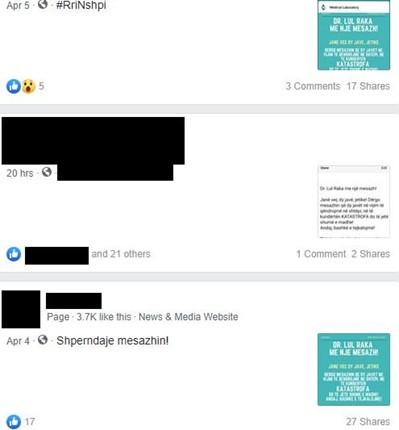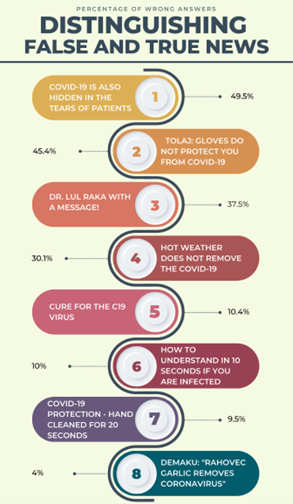We live in a reality where distinguishing misinformation and disinformation from accurate information has become very difficult. It’s one of the biggest challenges that societies around the world face. The journal, “Media and Communication,” recently released results from a study about infodemic in Kosovo during COVID-19. In the scientific article, titled “Infodemic and the Crisis of Distinguishing Disinformation from Accurate Information: A Case Study on the Use of Facebook in Kosovo during COVID-19,” the authors, Gëzim Qerimi and Dren Gërguri write that “citizens failed to distinguish between false and true news. The results also highlight that education and the economic situation were significant indicators, with less educated people, and people with the weakest economic well-being are more likely to believe false information.”
In today’s information environment, it is vital that citizens are able to distinguish false information from legitimate news and can react to mis- and disinformation appropriately. Healthy reactions can include: ignoring the mis- or dis-information, warning those around them about it, searching for other sources of information, as well as reporting the incident of mis- or dis-information to the platform that disseminated it. The above mentioned study concludes that “the ability to distinguish between information that is true and untrue may help people place more faith in information that is real. Because individuals may mistake misinformation and disinformation for accurate information, being able to distinguish between the two may help to increase public confidence in the veracity of information.”
Online media - the second most important source of information after TV – the most trustworthy source in times of crisis
In Kosovo, there is a significant gap between the use of the media as a source of information and the level of trust that people have in the news they receive from those media sources. The most trustworthy source of information is television. The study found that in Kosovo, “around 30% of citizens believe that trust in the media has decreased as a result of the way journalists report, as well as dubious or untrue information that has been circulated during the pandemic period. However, most of them (59.9%) think that reliability has not changed during the health crisis.”
The study shows that online media, which are the second most important source of information in Kosovo, do not have reliability more than 8%. A Public Opinion Poll, conducted by The National Democratic Institute (NDI) in the period 13-20 May 2020 with 1300 respondents throughout Kosovo indicates that 81% of Kosovo residents think that online media frequently or sporadically publish inaccurate information, which is one of the reasons why people do not trust online media.
Citizens in Kosovo did not know what to believe and what not to believe
The study asked respondents to read four news headlines and only one - regarding hand washing as a technique to prevent COVID-19 - was considered trustworthy. As many as 74.5% of respondents believed this to be true, while only 9.5% thought it was incorrect. Meanwhile, other information, despite being true, was not trusted by almost half of the respondents. For example, the news that COVID-19 could hide in human tears was real news, but it was the least believed with 49.5% of respondents thinking it was false. On the other hand, despite being untrue, the information that respondents believed most was a message which was distributed claiming to be from the local expert, Dr. Lul Raka and among other things was written that a major disaster will occur as a result of the COVID-19. Raka himself has shown that he is not the sender of the message. However, people believed the message was from him and they believed it. This was a viral was misinformation that has been circulated a lot through on Facebook, Viber, Instagram and WhatsApp.,

[Screenshot of Facebook pages and profiles that shared this misinformation during April 2020]
The figure below shows the respondents’ wrong answers in the survey, when respondents either believed false news or did not believe real news.

These results indicate that institutional initiatives are needed in order to help people critically evaluate the information they are exposed to. This problem concerns all European countries and has been addressed by another study in Romania. As Qerimi and Gërguri state in their study, “it is very important to increase media literacy skills among citizens, in order to combat disinformation and misinformation.”
The Ministry of Education, Science, Technology, and Innovation in Kosovo must act and give media literacy the necessary attention. An article published earlier on HiveMind explains the current situation and the necessary actions that need to be taken.
In today’s information environment, we must first ask ourselves three fundamental questions (the model of three basic questions presented in 2020) before we begin to believe the information we are exposed to:
1. Who is the author of the material and are they credible?
It is crucial to know who they are, what they specialize in, why they are qualified to deliver this information, as well as their trustworthiness and background.
2. Have you checked the story on multiple sources?
This emphasizes the value of reading the same information across platforms and channels. Such practice offers a wider perspective on the information and a more comprehensive context, which will aid in creating a clearer image of the truth.
3. Is the information evidence-based and backed by reliable and official sources? Does it provide images, videos, or other independently verified facts?
Relying on these three-questions model ensures we will be able to learning about how to access media information in the media securely and how to determine if the material we are reading is true or false.
We can then start to develop “immunity” against disinformation and feel more certain about the accuracy of the material we rely on.
If you want to dive deeper into the subject of disinformation, register to our free, online course on "Countering Disinformation":
Background illustration: Photo by Mike Chai from Pexels / Pexels license
